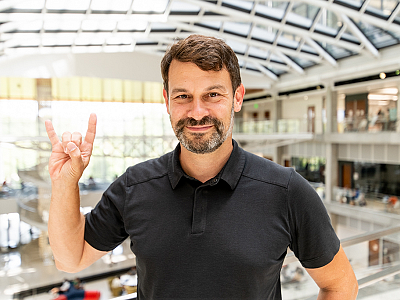New Chair of the Walker Department of Mechanical Engineering, Donald Siegel, joined UT Austin in August 2021. His expertise in energy storage, coupled with a level of enthusiasm for conducting research at a university he describes as “the epicenter of scientific computing,” has made him a welcome addition to the Oden Institute, Texas Advanced Computing Center (TACC), and the Cockrell School of Engineering.
Siegel is a Temple Foundation Endowed Professor holding a Cockrell Family Chair for Departmental Leadership, and is a Core Faculty Member in the Texas Materials Institute and in the Oden Institute for Computational Engineering and Sciences.
With a resume like that, Siegel is clearly in demand. He chose to come to UT Austin to work toward his goal of cracking the code on one of society’s most important grand challenges — energy storage.
Home to a globally recognized group of experimentalists working on battery materials, including the 2019 Nobel Laureate in Chemistry, John B. Goodenough, co-inventor of the lithium-ion battery, UT Austin is an attractive place for energy storage researchers. So, there were more reasons for Siegel to move to the Lone Star State than the addition of new academic titles.
“We focus on three types of energy storage: electrical, thermal, and chemical,” Siegel said. “Batteries fall in the first category, and battery R&D represents the largest effort within my group. One area of emphasis is the discovery of new solid electrolytes that might enable solid state batteries. These batteries would have larger energy densities than today’s lithium-ion systems, yet also be safer than today’s batteries."
Having spent the previous 12 years as a faculty member in the Department of Mechanical Engineering at the University of Michigan, Siegel began his career as a technical expert at Ford Research and Advanced Engineering. This prized combination of both academic and industry experience provided Siegel with a broader perspective on the kind of research he was not only interested in, but that was also going to be of use to society more generally.
“While working as a researcher at Ford, I was introduced to the concepts of sustainability and mobility. I came to understand that the combination of these two ideas into a single concept, sustainable mobility, was a grand challenge whose solution would have undeniable benefits to society. That was all the motivation I needed.”
